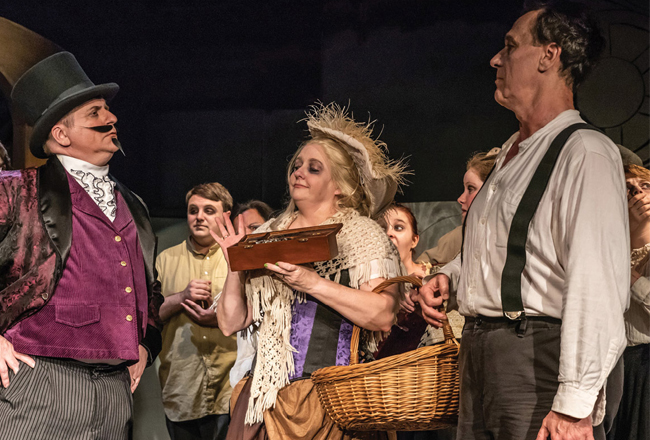
It”™s been an eclectic and often raucous year on the stage of the Brookfield Theatre for the Arts.
This season”™s slate began with Neil Simon”™s bittersweet nostalgic comedy “Lost in Yonkers,” followed by Topher Payne”™s McCarthy-era sexual-political farce “Perfect Arrangement,” the bawdy musical “The Best Little Whorehouse in Texas,” a family friendly “Annie Jr.,” the Scottish regicide of Shakespeare”™s “Macbeth” and, now playing through Nov. 23, the hard-rocking “Green Day”™s American Idiot.”
It”™s not every community theater that offers such a diverse mix of shows that run the full emotional gamut. But in its 63rd season, this Connecticut venue doesn”™t want to play it safe.
“Our mission is to bring art and entertainment to the community, not just entertainment,” explained Rebecca Pokorski-Cebollero, the theater”™s vice president. “We try to tackle some real hard subjects that some other theaters may not want to tackle. But we have the freedom to do that here.”
The Brookfield Theatre is unique on several levels.
It is a 100% volunteer endeavor and owns its building, which was constructed in 1907 as the gymnasium for the long-defunct Curtis School for Boys. Pokorski-Cebollero added that many of the volunteers involved in the productions came from professional entertainment careers.
“We attract a lot of retired professionals, people who said, ”˜Eh, I don”™t want to do the business anymore and the rat race, but I want to be in it because I love it,”™ ” she continued. “That”™s why we get so much good talent. A lot of us are former Broadway people. I used to work in costumes.”
Lou Okeller, the theater”™s president, taps a local base of acting talent when casting the shows and noted that some of the more ambitious productions have brought in actors from out of the area.
“We have some people who come traveling from a distance if we are doing a show that is not done very often,” Okeller said. “We”™ve had actors come from West Hartford, New Haven and New York state if there”™s a show that really intrigues them.”
Okeller expressed appreciation for the volunteer corps in keeping production costs down.
“The biggest expense is mostly the rights,” she stated. “The licensing costs are a lot. Because we have a larger audience than our neighbor community theaters, we pay for 135 seats. For non-musicals, we can sometimes range somewhere (between $4,000 and $5,000). Musicals have more rights and more costumes. Those tend to be more expensive.”
The theater prides itself on presenting works that push the proverbial envelope with subject matter.
Pokorski-Cebollero cited recent productions of “Bent,” Martin Sherman”™s drama about homosexuals in Nazi concentration camps, and “The Wild Party,” Andrew Lippa”™s musical set amid Jazz Age debauchery, as examples of the theater”™s “risk” shows. This season”™s “Macbeth” production was also intended to challenge local audiences.
“A lot of people were a little reluctant because they were afraid of Shakespeare and didn”™t know if they would understand it,” said Okeller. “But once they could start to see what we were doing here, there was a lot of support.”
But not every show is a smash. Okeller admitted surprise that a 2018 staged reading of the Reginald Rose classic “12 Angry Men” did not connect with audiences.
“We had the most incredible cast here, but we didn”™t have a full house,” she lamented. “I was astounded.”
There is one area where the theater has yet to actively tread: premiering original shows. While the venue has hosted workshops of new plays and did a concert version of songs from new musicals called “Fresh Baked Musicals,” it has no plans to become a first-run theater.
“I am not certain if we would take an original piece and do it as a main stage production until we really workshopped it in a staged reading capacity,” said Pokorski-Cebollero.
The Brookfield Theatre has self-financed via ticket sales and individual donors, and Pokorski-Cebollero said plans were underway to expand fundraising via grants and corporate sponsorship.
“We need a grant reader,” she stated. “The more money that we have, the more things we can do.”
A key element to ensure future productions is to encourage and train the next generation of theatrical artists. Through its Spotlight Program, children participate in the creation of shows, and next year one of the Spotlight efforts will be highlighted as a main stage event. Pokorski-Cebollero pointed out that the Spotlight Program is offered free, which opens a door that many youngsters would not have been able to access otherwise.





















